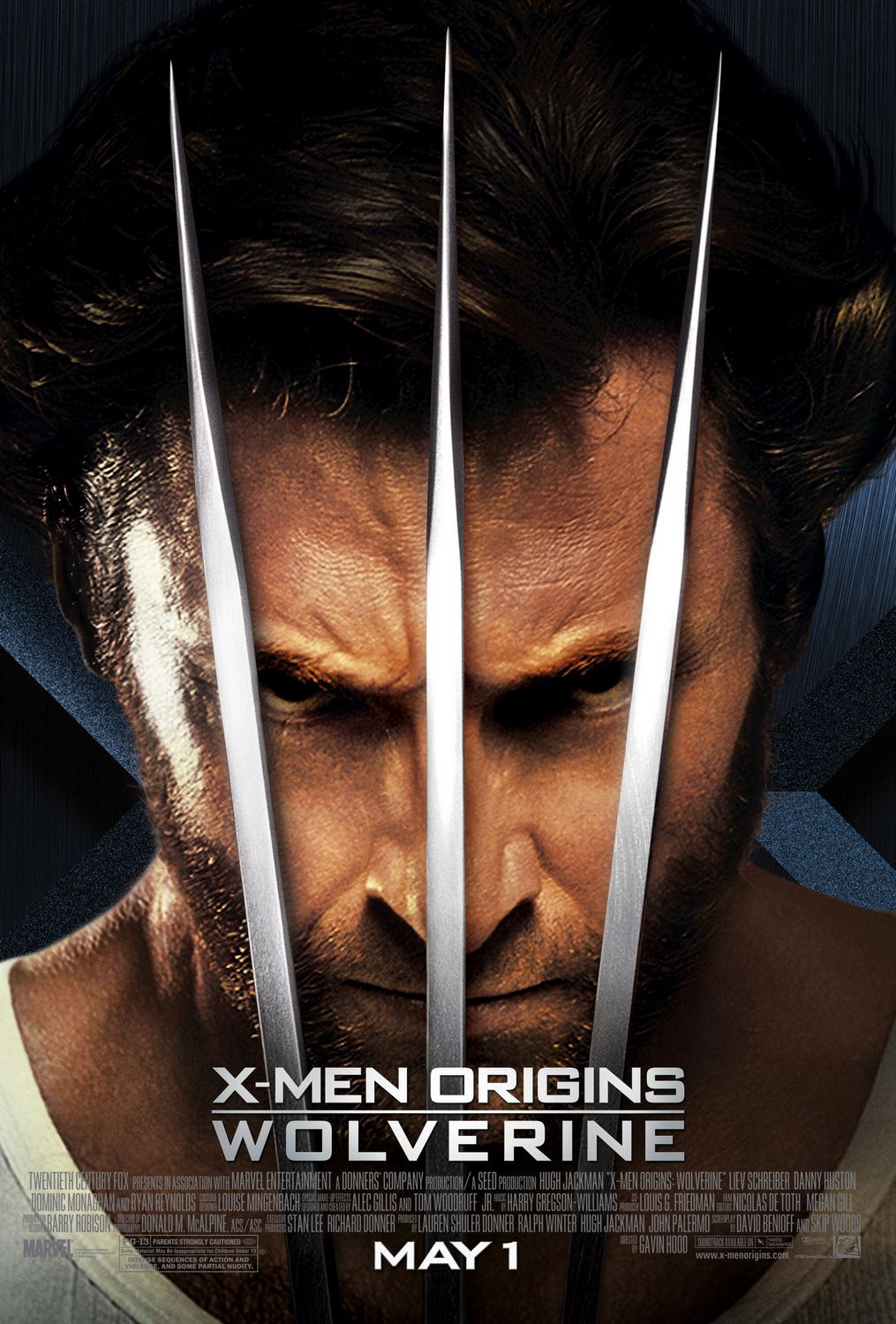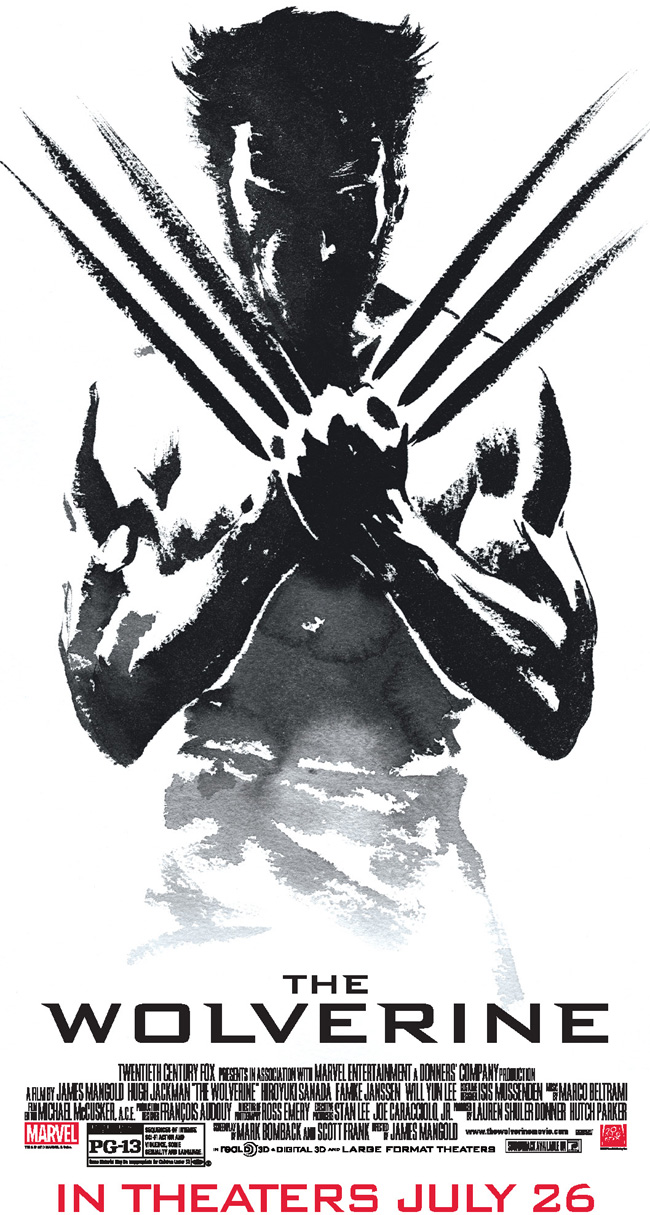
Last week, we looked at the original X-Men trilogy, and so to begin this week's post we'll be recapping the spin off trilogy: X-Men Origins: Wolverine, X-Men: First Class and The Wolverine.
Ah yes, X-Men Origins. Let's get this one out of the way.
 |
| Ugh. |
X-Men Origins: Wolverine
Following the disappointment of The Last Stand, things were looking shaky for the X-Men franchise, but few could have predicted just how bad things could get. In hindsight, however, the signs were all there. 20th Century Fox announced that they would be taking the series down the prequel route, beginning with a film about Wolverine before moving on to origin stories of Professor X and Magneto, as well as a Deadpool film that mercifully never materialised. The potential (from the studio's standpoint) looked great - a respectable director in Gavin Hood, and an almost endless roster of characters on which to base stand-alone films, not to mention sequels and cross-overs. At the centre of the hype machine was Hugh Jackman himself, promising audiences that this would be the film where Wolverine would finally be let loose, relentlessly tearing up bad guys and answering those questions left tantalisingly unanswered by the original trilogy. But alas, in a post-Phantom Menace world, audiences were only too familiar with the empty promises of ambitious prequels, with the empty rhetoric of 'returning to the spirit of the original' falling on skeptical ears. Critics' and audiences' reticence was borne out when, after a rough cut of the film was leaked online, Origins was hurriedly released to cinemas. When it arrived, anyone who hadn't already seen it was greeted with one of the worst superhero films ever released. Far worse than The Last Stand. Worse than Daredevil. Worse even, dare I say it, than Batman and Robin. Unfinished special effects, juvenile, boring action sequences, wasted characters, and an appalling screenplay were but a handful of the sins of which Origins was guilty. Beyond laboriously listing the film's many, many problems (not least the shoddy, unnecessary use of CGI claws and the stunt casting of Will. I. Am), there isn't a great deal more to say on Origins, but it is important to at least acknowledge this film, because its critical and commercial failure marks a crucial change not only in the fortunes of the X-Men franchise, but more importantly, in 20th Century Fox's approach to their series. The original idea following the release of Origins was to produce similar stories based on Xavier and Magneto. Unsurprisingly, these films were shelved following the train wreck of Origins, and it looked like the franchise was dead in the water. Only two years later, however, those Magneto / Xavier origins plans were dusted off and retooled into X-Men: First Class, a quasi-reboot-prequel, and somewhat astonishingly, one of the best films of the series.


X-Men: First Class
Nobody suspected that a follow-up to Origins could have been anything other than a further descent into schlock. Indeed, a tacky, cheap-looking early promotional poster suggested as much to the few people who were still paying the series any attention. But then, this atmospheric trailer arrived, suggesting a character-driven story and a renewed focus on the friendship between Magneto and Xavier. And of course, Matthew Vaughan, responsible for Layer Cake, Stardust and the previous year's terrific Kick Ass (not to mention second choice to make The Last Stand - if only!) was directing. Maybe, just maybe, this one might be alright.
And boy, is it ever: rather than suffering from prequel-itis, First Class' sixties setting injects a sense of fun and colour arguably missing from even the first two good X-Men films. Michael Fassbender stands out as the young Erik Lensherr / Magneto, particularly in a brilliant Euro-hopping sequence where he tracks down his former Nazi tormentors, which plays out not only as an exhilarating action segment in its own right, but also as the best James Bond audition tape never filmed. Elsewhere, James McAvoy is brilliantly cast as a young Charles Xavier, playing him against expectations as a cocky ladies man thoroughly enjoying the swinging sixties. Rather than undermining Patrick Stewart's interpretation of the character as a calm scholar, McAvoy adds new dimension and depth to him. Its subtle yet consistent subversion of our expectations is perhaps First Class' greatest strength. On paper, for example, writing Xavier and Mystique as adoptive siblings sounds bizarre, but McAvoy, Vaughn, and the wonderful Jennifer Lawrence make it work. Their dynamic creates new perspectives on the groundwork laid by Bryan Singer, especially with regard to Mystique's dedication to Magneto. More importantly, in casting Magneto in a sympathetic light, and grounding his world view in his experiences of the holocaust, Fassbender enriches McKellan's older version of the character, leaving us in real ambivalence over just how far we can read Magneto as a simple villain. Of course, First Class has its share of flaws: for one thing it's littered with continuity errors with all the previous films, especially The Last Stand and Origins, although any X-Men film that disregards the events of those two is fine with me. Additionally, Fassbender's weird English-American-Irish accent becomes pretty distracting, there are a few visual effects that look unfinished, and Beast's blue make up, replete with nerdy spectacles, raised audible titters of derision in the cinema audience when I first saw the film. More importantly, the ending feels a little too neat and tidy, with Erik donning the Magneto helmet, Mystique joining him, and Charles being paralysed all happening within minutes of each other. The nadir of the film comes, however, in an embarrassing contrivance that has Rose Byrne strip to her lingerie underwear to infiltrate a nightclub, as well as January Jones' ridiculous wardrobe as Emma Frost. It's a shame, because the few female characters in the film are otherwise treated sensitively as actual human beings with their own motivations and agendas, but here Byrne and Jones are used to pander to a perceived adolescent male viewership. With those exceptions, the rest are minor complaints in a film that performs a near miracle in reviving a moribund franchise, so much so that First Class feels at times like a lesson to George Lucas in how to tell an origin story of friends-turned-enemies. Alongside X 2, this is not only one of the best films of the series, but one of the best comic book movies ever made.

The Wolverine
How does a studio follow the critical success of First Class? By returning to the concept that almost derailed the franchise, of course! Yes, The Wolverine is the second-attempt to bring audiences a stand-alone Wolverine movie. In what seems to be an X-Men tradition, the film was originally set to be directed by Darren Aronosfky, before changing hands to James Mangold. Hugh Jackman assured audiences that this one really would be 'true to the character', repeatedly, but as we know, promises like these had been made and broken in the past. And so it came as somewhat of a surprise that The Wolverine is actually rather good. Let's not get ahead of ourselves: it can't touch First Class or X 2, and isn't even quite as good as Singer's original, but as a standalone film it's entertaining, well paced and at times very nicely shot. Compared to the other Wolverine film it's a masterpiece. Although it's set up as a quasi-sequel to The Last Stand (creating yet more continuity problems with First Class), The Wolverine more or less distances itself from the other films, giving the sense that this is a chapter in an ongoing saga of Wolverine adventures, connected to but independent of the wider X-Men story. In many respects, it feels like a lot like James Bond film, perhaps not up to the Connery-esque standard of Magneto's European sequence in First Class, but as least as good as your average Dalton or Brosnan outing. This is especially true of the bullet-train scene, which stands out as one of the best and most imaginative action sequences of the series. True, there are significant problems with the film - it sags heavily in the middle, the motivations of many of the characters often feel needlessly obfuscated or overly complex, and the climax somehow succeeds at feeling both underwhelming and ludicrously over the top. Not to mention, the film has the dubious honour of giving us the series' worst female character to date in the Viper. In her every appearance she dresses in increasingly fetishistic outfits, before declaring in her final scene that she is immune to all poison, including the worst of all: 'men'. It's the most embarrassing moment of the film, which is not an insignificant achievement given it's in the same scene as an enormous samurai robot piloted by an aging World War II veteran.
Despite its standing as the least good of the good X-Men films, I'd argue that The Wolverine holds the key to the structure of the series as a cohesive story, and to the future of expanded universe action franchises. Although I have an uncommon regard for the film, undoubtedly the most satisfying part of the film is the post-credits sting, wherein Magneto and an inexplicably-resurrected Xavier jointly recruit Wolverine for an all-important-but-mysterious mission as a blatant teaser for the next proper X-Men instalment. The Last Stand and Origins also had post-credits teasers, which inevitably went nowhere. In contrast, The Wolverine's teaser is setting up a film already in production, and is clearly influenced by a practice established by the ubiquitous Avengers films. This is why The Wolverine is the key to uniting the X-Men franchise into a coherent story. Until this film, the series was produced in an almost admirably haphazard way, lurching from one film to the next, with plans for spin offs, origin stories and prequels fulfilled or forgotten on the whims of fortune. Although the upcoming Days of Future Past will tie together the First Class and Original Trilogy stories, The Wolverine is really the first film in the series to openly suggest a long-term plan for the franchise. Moreover, unlike the Marvel studios films, which all invariably lead toward the next Avengers instalment, The Wolverine succeeds at both joining the dots between the existing X-Men films, and laying the foundations of future spinoffs not directly connected to the main story. Marvel's Avengers is clearly the inspiration for Fox's renewed dedication to their franchise, and there's no doubt that Marvel's approach to interconnected franchises will inform the mindset of major studios to their properties for the forseeable future. However, it would be a mistake to dismiss the X-Men series as a poor-man's Avengers. In fact, I argue that Fox's scatter-gun approach to story telling, and their admirable disregard for a slavish adherence to continuity is actually closer to the tradition of comic-book story telling than the Avengers. And like universe-resetting comics such as DC's Crisis on Infinite Earths, Fox's Days of Future Past promises to correct some of the continuity problems between its prior films.
Next week will see the conclusion to this series of X-Men posts, in which I will look at the odd but illuminating relationship between the X-Men films and the Universal Horror cylce.
No comments:
Post a Comment